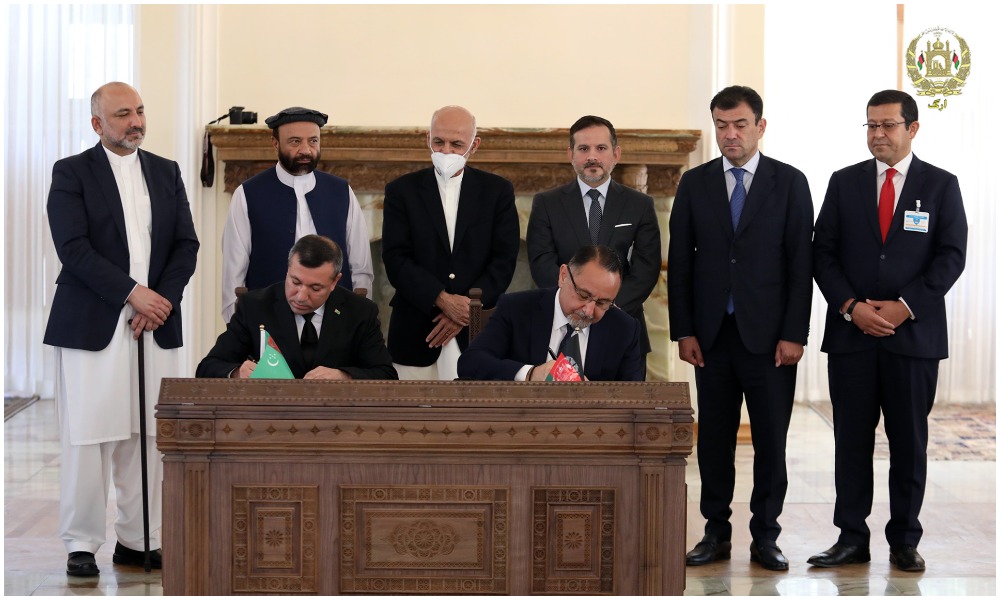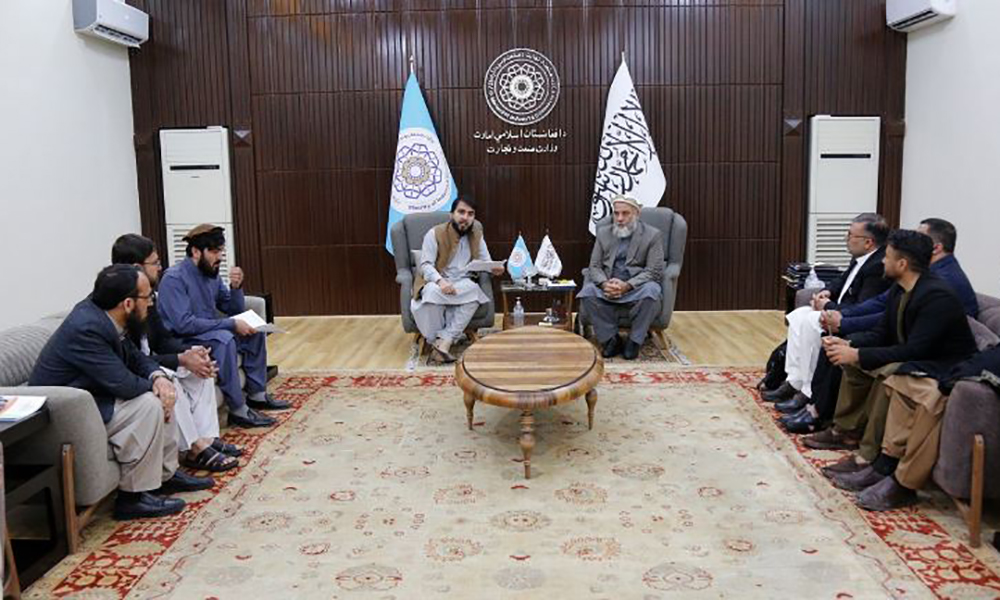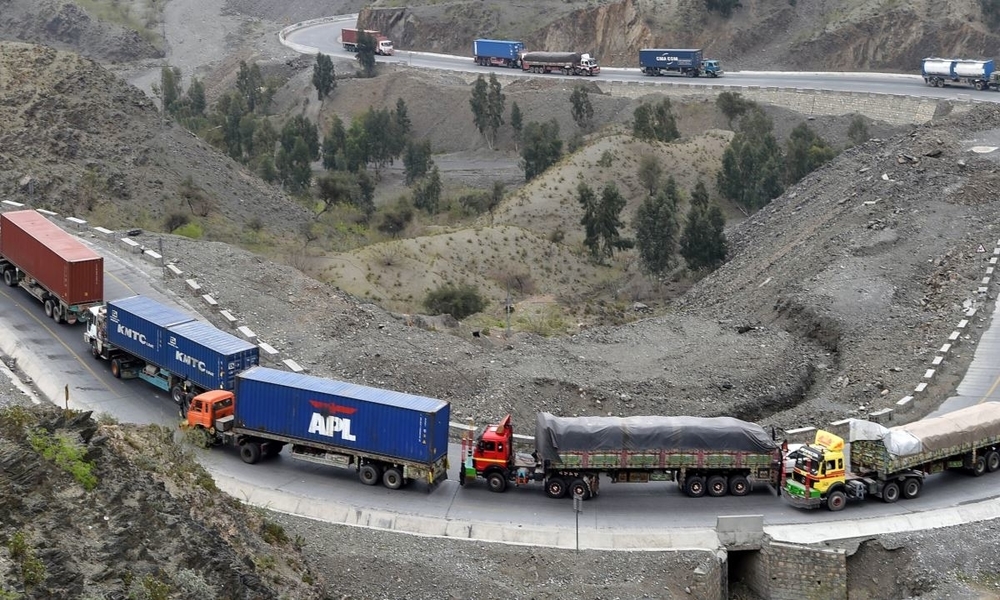Business
Afghanistan, Turkmenistan sign MoUs, seal private sector contracts

Afghanistan and Turkmenistan signed three memoranda of understanding (MoUs) and an economic cooperation agreement in Kabul on Wednesday for electricity and fiber optics.
In a statement issued by the Presidential Palace (ARG), two companies will be responsible for transferring 500 MW of electricity from Turkmenistan to Afghanistan and for connecting a fiber optics network. The companies are Afghanistan’s Bayat Group and Turkmenistan’s Chalak Company.
During the official signing ceremony, Afghan President Ashraf Ghani thanked the two companies for their cooperation and said Turkmenistan and Afghanistan are proving to be good neighbors amid efforts to strengthen diplomatic and economic ties.
“Thanks to the presence of Bayat Group and Chalak Private Company, it shows that Afghan and international private companies have joined hands to provide electricity,” Ghani was quoted in the statement as having said.
“Fiber optics is the infrastructure of the 21st century and this infrastructure gives hope to our youth. Innovative work in the 21st century is impossible without a comprehensive understanding of fiber optic networks, connectivity and modern technology,” he stated.
Representing Turkmenistan at the event was Turkmen Ambassador to Afghanistan Ovezov Hoja Sapargeldievich.
The ambassador said talks between the presidents of Turkmenistan and Afghanistan had always been about bilateral cooperation and partnership. He said his country supports all efforts and initiatives for peace and stability in Afghanistan and hoped that Afghanistan would achieve peace as soon as possible.
Ghani in turn thanked the ambassador and the President of Turkmenistan Gurbanguly Berdimuhamedow and said that with ongoing efforts to strengthen ties new avenues, including the lapus lazuli and silk road routes, were projects that will be delivered on.
He said the countries were today able to revisit history and make up for the time lost in recent years.
Ghani also said the TAPI pipeline project would benefit both countries and the people of Afghanistan.
“Turkmenistan is a good neighbor not only to Afghanistan, but to all of us, and we are going back to our ancient roots,” he said.
Business
Afghanistan’s economic prospects are bleak: World Bank

The absence of GDP growth coupled with declining external financing avenues for off-budget expenditures paint a bleak picture of Afghanistan’s economic prospects, the World Bank said.
After a severe 20.7 percent GDP contraction in 2021, the Afghan economy contracted further by 6.2 percent in 2022, the bank said in a report.
“While Afghanistan’s agricultural and subsistence economy, including illicit opium production, provided some resilience in rural areas, higher prices, reduced demand, lower employment, and disruptions to services had severe impacts across the country,” it said.
The proportion of households that did not have enough income to meet basic food needs more than doubled from 16 percent to 36 percent in this period, according to the bank.
In the context of deep concerns about the policies of the Islamic Emirate of Afghanistan (IEA), including restrictions imposed on women and girls, the international community, including the World Bank, recalibrated its approach to supporting Afghanistan: first to providing humanitarian support and then to providing off-budget support for basic service delivery and livelihoods.
However, IEA moved to restore domestic revenues, which reached $2.2 billion or 15 percent of GDP in 2022. “Nevertheless, overall economic activity remained depressed, unemployment stayed high, and the banking sector was dysfunctional due to constraints on international transfers and concerns about liquidity and solvency.”
World Bank said that Afghanistan’s economic outlook remains uncertain, with the threat of stagnation looming large until at least 2025. “This economic stagnation will deepen poverty and unemployment, with job opportunities expected to decrease and food insecurity expected to increase.”
The bank noted that for a sustainable future, Afghanistan needs to focus on its comparative advantages, particularly in the agricultural and extractive sectors. Agriculture could be a key driver of growth and poverty reduction, with the potential to create jobs, it added.
Business
Commerce ministry inks 10 MoUs to boost development of small and medium-sized businesses

The Ministry of Commerce and Industry said Thursday it has signed cooperation agreements with ten institutions to support the development of small and medium-sized enterprises.
Nooruddin Azizi, Acting Minister of Commerce and Industry, said: “In the implementation of projects, we must pay special attention to our activities and actions and try to make useful use of the projects according to the requirements and benefit the beneficiaries.”
These ten institutions are to present their projects, the total value of which is around over $1.1 million. The projects will be carried out in Kabul, Baghlan, Ghor, Herat, Logar, Nangarhar, Balkh, Badakhshan and Jawzjan provinces and provide direct jobs for about 1,000.
To date, the ministry has signed MoUs for 72 projects in total, collectively valued at about $53.6 million.
These agreements have been signed with domestic and foreign companies for the establishment of small and medium-sized businesses.
In accordance with the principles and laws of the Islamic Emirate and prioritizing the implementation of projects for immigrants and returnees and internally displaced people, the ministry said 635,865 people will benefit through jobs directly and over 4.3 million will benefit indirectly in 25 provinces once these projects are implemented.
Business
Export volume totals over $140 million in last month of 1402

The National Statistics and Information Authority (NSIA) confirmed Tuesday that in the last month of solar year 1402, (March 2024) Afghanistan’s exports totaled $141.1 million and imports totaled $789.6 million.
This was down from $174 million for exports in the same period in 1401. However, imports increased by $99.2 million in 1402, up from $690.4 million.
Most exports in the last month of 1402 went to Pakistan, India and the United Arab Emirates, while in the last month of 1401 exports went to Pakistan, India and China.
-

 Sport5 days ago
Sport5 days agoACL fever grows as fixtures finalized
-

 Latest News5 days ago
Latest News5 days agoUS identifies Kabul airport suicide bomber
-

 Business5 days ago
Business5 days agoAfghanistan-Kazakhstan chamber of commerce opens in Herat
-

 World4 days ago
World4 days agoIsraeli military vows response to Iran attack as calls for restraint mount
-

 Sport3 days ago
Sport3 days agoATN secures exclusive rights to broadcast Paris 2024 Olympics
-

 Latest News4 days ago
Latest News4 days agoPakistani police give Afghans in Balochistan one day to leave
-

 Latest News4 days ago
Latest News4 days agoHekmatyar slams US for ‘occupying’ Afghanistan’s airspace
-

 Latest News4 days ago
Latest News4 days agoMedia Violation Commission bans two TV channels

























